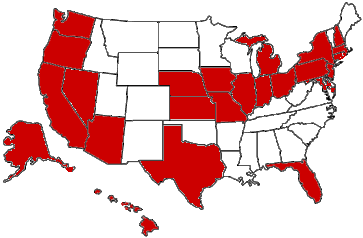Today I sent Routledge the manuscript for Radio’s Digital Dilemma: Broadcasting in the 21st Century. 81,221 words over eight chapters, 285 typescript pages in all. The publisher’s new synopsis: Continue reading “Radio's Digital Dilemma Out the Door”
Month: July 2013
The Free Radio Network: 1993-2013?
It’s been quite a ride for the Free Radio Network, an historic online hot-spot for discussion of pirate radio in the United States. The FRN was launched in 1993 as a dial-up bulletin board system (BBS) administered by shortwave pirate enthusiasts John Cruzan and Kirk Trummel.
After transitioning to the Internet, the FRN expanded far beyond its message boards, though those remained a primary draw. In the early days of the World Wide Web, The Free Radio Network was one of the few places online where pirate broadcasters and allies could have frank discussions about their activity and its implications. It’s also been a primary collection-point for reception reports involving shortwave pirate stations. Continue reading “The Free Radio Network: 1993-2013?”
Massachusetts Mulls Anti-Pirate Law
Lawmakers in Massachusetts are hard at work trying to outlaw unlicensed broadcasting. H.1679 was introduced in the state House of Representatives in January and got a hearing in the legislature’s Joint Committee on the Judiciary just last week. Floor votes are expected before the end of the year.
If approved, Massachusetts would become the fourth state in the country to pass an anti-pirate radio law. Continue reading “Massachusetts Mulls Anti-Pirate Law”
Wisconsin Center for Investigative Journalism Saved from Eviction
Good news from Madison: Governor Scott Walker used his line-item veto power for good late last month and struck a provision that would have evicted the Wisconsin Center for Investigative Journalism from the UW-Madison campus and prohibited journalism faculty from working with it.
Slipped into the state budget in the dead of night by an anonymous Republican lawmaker and the subject of national controversy, Walker killed the item because he didn’t feel it was appropriate to single out one particular group in such a way. Instead, he is asking the UW Board of Regents to review its policies on campus facilities-sharing with outside groups. Continue reading “Wisconsin Center for Investigative Journalism Saved from Eviction”
Pirate-Hunting: FCC Plods While Local Scenes Bubble
Halfway through 2013, and the FCC’s pace of unlicensed broadcast enforcement shows no real change from 2012: 106 enforcement actions in all, targeting more than three dozen stations, with the majority of this activity wholly administrative in nature. Pirate stations who appear on the FCC’s radar can now expect a warning letter to arrive via certified mail 1-6 weeks after an initial visit. Ignore those, and the agency may start asking for money.
 To date, the FCC has handed out $60,000 in Notices of Apparent Liability and $125,000 in actual forfeitures. However, not all of these penalties are new: in February, the FCC socked Whisler Fleurinor with a $25,000 fine for unlicensed operation in Fort Lauderdale, Florida. This is actually Fleurinor’s second go-round – he was first busted in 2010 and given a $20,000 forfeiture in 2011, which was later reduced to $500. It’s much the same story for Gary Feldman, who was first busted in 2004 for pirate broadcasting in Miami. He was caught again last year and fined $25,000 this year. Moreno’s 2004 forfeiture ($10,000) was never paid. Continue reading “Pirate-Hunting: FCC Plods While Local Scenes Bubble”
To date, the FCC has handed out $60,000 in Notices of Apparent Liability and $125,000 in actual forfeitures. However, not all of these penalties are new: in February, the FCC socked Whisler Fleurinor with a $25,000 fine for unlicensed operation in Fort Lauderdale, Florida. This is actually Fleurinor’s second go-round – he was first busted in 2010 and given a $20,000 forfeiture in 2011, which was later reduced to $500. It’s much the same story for Gary Feldman, who was first busted in 2004 for pirate broadcasting in Miami. He was caught again last year and fined $25,000 this year. Moreno’s 2004 forfeiture ($10,000) was never paid. Continue reading “Pirate-Hunting: FCC Plods While Local Scenes Bubble”